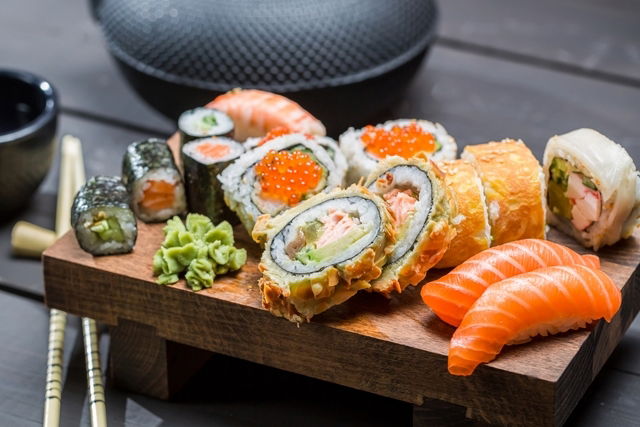A pregnancy diet takes into consideration specific foods that should be avoided, like raw fish, uncooked meat and unpasteurized milk. There are several foods that can hinder the baby’s normal development and be harmful to your health.
Toxic substances such as alcohol, excess sugar, raw fish, and inadequately washed fruits or vegetables should be avoided as they may be contaminated with harmful micro-organisms that can affect the baby.
If you are unsure of the food you should eat and how to structure your meals during pregnancy, you are advised to speak to a registered dietitian. He or she will assess your health needs and your current status to develop a meal plan that is conducive to a healthy pregnancy.

These are the foods you should avoid eating when pregnant:
1. Raw fish and undercooked meat
Raw fish, such as sushi and undercooked meat should be avoided in your pregnancy diet, these foods are at a higher risk for containing a bacteria called listeria. This bacteria can cause miscarriage and premature labor. Such foods may also cause infections like cysticercosis, a parasitic infection that can attack the nervous system and hinder the baby’s brain development.
2. Raw eggs
Raw and undercooked eggs should be avoided because they may contain bacteria called salmonella, which can cause diarrhea, vomiting, fever, and death.
You should be wary of desserts, sauces, and homemade seasonings made with raw eggs, such as homemade mayonnaise or Caesar salad dressing.
3. Unpasteurized milk
Unpasteurized milk, or milk that comes directly from farms, should be avoided when pregnant because it contains higher levels of bacteria that can cause bowel infections, diarrhea, and general discomfort.
Therefore, you should always have UHT or pasteurized milk, as these types of milk are processed at high temperatures in order to eliminate any microorganisms that might be present.
4. Unpasteurized cheeses
For the same reason mentioned above, unpasteurized cheeses, like camembert, gorgonzola, and Danish blue cheese, should also be avoided during a pregnancy diet. They are also at higher risk for containing listeria, contain a lot of water, and they may contain listeria, which can cause headaches, chills, convulsions, and meningitis. This bacteria can affect the baby’s nervous system and, in more serious cases, cause a miscarriage.
5. Unwashed fruit and vegetables
Fruit and vegetables that are not washed correctly are common sources of toxoplasmosis contamination, which can lead to premature labor, malformations, and even miscarriage and death of the baby.
Therefore, all fruits and vegetables should be washed properly before being ingested raw. You should avoid eating these foods in places where you are unable to confirm they are properly washed.
6. Canned tuna
Fish such as tuna, mackerel, sword-fish, dogfish, and grouper should be avoided during pregnancy because they contain high levels of mercury and heavy metals which can affect the development of the baby’s nervous system.
On the other hand, sardines, trout, herring, gray snapper, mackerel, and tuna from fish farms are safe for mother and baby and are good dietary options.
7. Coffee
Some studies show that too much caffeine can cause miscarriages. Therefore, pregnant women are advised to limit caffeine intake to 300 mg per day, which is about two to three cups of coffee.
8. Food with caffeine
In order for the expectant mother to stay within the caffeine intake limit, foods and drinks that contain caffeine should also be avoided. This includes coca-cola, green tea, black tea, and mate tea.
9. Sweeteners
Even though most sweeteners are safe for your health, pregnant women should avoid artificial sweeteners, such as cyclamate and aspartame, and opt for natural sweeteners made from sucralose or stevia. These options are safer for the baby, even in high quantities.
10. Alcoholic drinks
Alcoholic drinks should be avoided throughout the entirety of pregnancy. A baby is unable to efficiently metabolize and eliminate alcohol from the body, and it can start to accumulate. This can lead to premature labor, a growth delay, and heart malformations.
11. Liver and vitamin A supplements
You should avoid eating meals prepared with liver, as this this organ meat contains high amounts of vitamin A. Vitamin A in excessive quantities is associated with abnormal fetal development and liver damage. Therefore, you should avoid eating liver and taking high amounts of vitamin A supplements during pregnancy.






























